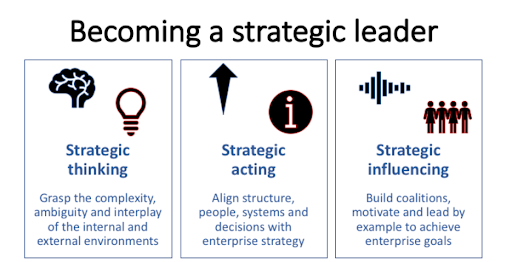Unlock Management Strategies to Transform into Adept Business Leaders
Table of Contents

- jaro education
- 10, January 2024
- 12:59 pm
While undertaking senior management business expansion strategies, it is necessary to have the capacity to adapt to prevailing situations. This transformation to unlock efficient management strategy to become an exceptional business leader is not only to gain a competitive edge but is an essential parameter to reach predefined business objectives. Proficient corporate management, therefore, constantly strives to create harmony between leadership abilities and overreaching management strategies for a successful business.
The significance of management strategies and business transformation backed by able leadership is genuinely apparent. Besides, it is a skill set that contemporary business leaders must remember! Further, you can become an expert by following the right business management strategies. In that case, consider pursuing the Post Graduate Certificate in Senior Management Programme organized by IIM Tiruchirappalli.
This exclusive course is for aspiring business management trainees and corporate managers inclined to specialize in modern management skills and mark their presence globally. This unique management program includes interdisciplinary points of view and hones leadership acumen for mastering a foolproof business expansion strategy. The course joiners get a comprehensive insight into the qualities of an ideal business leader with the help of theories of management and their underlying concepts and paradigms.
Enhancing Performance: The Role of Leadership in Business
Leadership is a crucial part of any business organization. It comprises the capacity to inspire, influence and direct company personnel toward attaining common goals of the business. A business leader sets a transparent standard for future endeavors, encourages co-workers to follow the established vision, and authorizes team members to work collectively and harmoniously.
In other words, an efficient leader successfully taps the potential of the human resources at his disposal. Business leaders imbibe practical communication skills and emotional intelligence and can deeply interpret the strengths and weaknesses of their subordinates. They implement a positive work culture, adopt trending technologies and innovations, and handle challenges with resilience and conviction.
Leadership in any sphere does not confine itself to any particular rank or position; it may come from any team member within the organizational framework who exhibits these natural traits and extends a sense of purpose and direction.
The Essence of Business Management
Business managers look after the day-to-day operations of an enterprise. They are responsible for strategizing, planning, hiring, and organizing human resources, other inputs, and impending tasks to achieve defined goals within the timeline.
Besides, they confirm that a distinct business expansion strategy is in place and allotted tasks get executed smoothly, efficiently and economically. Practical management skills require strong and excellent organizational and determining abilities, the adeptness to delegate responsibilities and a keenness for details. They are also accountable for meeting short-term goals and maintaining the ideal productivity metrics.
A Brief Account of Strategic Management
Most companies have leaders with strong operational skills required to uphold business ethics. However, they frequently need more people in positions of power with the expertise, proven experience and confidence to deal with intricate issues. As per management terms, these issues refer to ‘wicked problems’.
You cannot simply solve these problems with a single command because they create causes that are impossible to understand, and corresponding solutions are beyond one’s reach. Moreover, these issues require companies to transform the way they do traditional business. These multiple challenges are notably present in the day-to-day affairs of almost every business when there is a need for senior management business expansion.
Given the negligible quantum of senior leadership who can manipulate large-scale transformation, eminent companies often hire leaders from external pools. However, a reliable management study says that in most cases, a business thrives when the leadership is from within the organization. When the leaders standing at the top positions of a company’s hierarchy understand the necessity to act strategically, they usually are willing to take up responsibilities.
As a result, the leadership gap widens, and the business starts faltering while operating traditionally. It is a phase of crisis that a company goes through when it needs dynamic leadership that will add a strategic dimension to the business operations. Fortunately, modern companies can build the capacity for strategic leadership and implement the most appropriate business expansion strategy and ideas.

*beatonexecutivecoaching.com
Six Principles of Management Strategies to Transform into Adept Business Leaders
Business management trainees and corporate management executives can use these details to unlock potential strategic leadership in their future endeavors. These unique principles reflect a combination of organizational structures and individual capabilities.
1. Distribution of Responsibilities
Business leaders responsible for strategic management acquire their capabilities through experience and a notable amount of autonomy. Top corporate leaders should delegate powers downward across organizational layers, empowering different levels of team leaders to make decisions in the interest of the organization. Distribution of responsibilities gives strategic leaders the scope to analyze the business risks when they take place due to their actions. Besides, it improves collective powers of reasoning, adaptability to changing situations, and resilience in adversities.
2. Transparency toward Information
Precise information should cascade from the upper to the lower management level. The line of communication from top to bottom should be as transparent as possible. The trouble is that most managerial positions share information only on a need-to-know basis. So, the recipients have to make further decisions unthinkingly.
However, it is difficult for them to know how their decisions will impact the business affairs of the enterprise. Guesses are often wrong when one is not aware of the larger picture of the business. Besides, the lack of information and the source of it make subordinates less confident. They cannot challenge their superiors if they find the decisions unfavorable to the company.
So, transparency toward information is the key to creating a higher level of productivity. Strategic leaders in leading businesses know that the genuine power of information comes from disclosing it to the right persons, which opens the path to new growth opportunities.
3. Multiple Options for Experimenting with Ideas
One of the key attributes of strategic leaders is to create and present pertinent ideas concerning the business. Besides, it is more critical to convey these ideas to the stakeholders for conversions like the company creates value. The management should encourage employees to bring their innovations to the surface and share them with others to maximize their creativity.
This way of thinking contradicts traditional business operations where new ideas end at the desk of a single decision-maker. The manager or decision maker may prefer something other than the ideas and block them from going forward. This way, the company might lose the best opportunities to prosper.
Some business entities organize special in-house sessions or sponsor attendance at eminent educational institutions like IIM Tiruchirappalli for senior management business expansion programs. Here, trainers stress reverse monitoring, where young aspirants share their ideas about new technology with the old participants, which is quite helpful in fostering business growth.
4. Learning from Mistakes
Fail fast and learn from mistakes should be the motto if one wants to unlock management strategies and become an impactful leader. The leaders in the making must have the courage to accept failure early in the processes and practices of the company. It is wrong to say that strategic leaders should learn from the successes of their efforts. On the contrary, they should also identify the classifications of failure that ultimately lead them to victory.
5. Access to Other Strategists
Management should give prospective strategic leaders opportunities to work with their peers across all levels and departments of the organization. This way, they will feel supported and adept in raising the strategic value of their organizational performance. There is no need for special treatment. Instead, the hierarchy should cultivate the idea that several team leaders have the potential to progress and become successful leaders. The management should form a group of enthusiasts and invite them to learn from one another. This action should create a more strategic environment for future growth.
6. Opportunities for Experience-Centric Learning
Professional leadership, in most cases, is informative as opposed to experiential. This should not be the case. Although conventional classroom-based training can hone decent managerial skills, management strategists need the experience to live up to the business reputation, the business should focus on long-term investment in the leadership pipeline.
In order to do so, the corporate hierarchy should schedule a series of intensive discussions of a particular result, let the team members analyze it, and expect them to develop some variables that might impact the result if implemented. The objective is to cultivate a superior understanding and use it for future efforts.
Conclusion
The need for proficient business leaders has reached an exceptional level in the emerging business scenario. If you are an experienced executive trying to become an adept business leader or a rising management aspirant eager to unroll yourself and prove your potential to be a future leader, then for people like you, IIM Tiruchirappalli offers a Post Graduate Certificate in Senior Management Programme.
You can enroll in this program through Jaro Education and begin your journey to becoming a strategic leader in your existing profile or shifting to any other global corporation. The learning process will be distinctly interactive with the support of modern technology and a range of pedagogical tools, techniques and top-notch strategies.









2 thoughts on “Unlock Management Strategies to Transform into Adept Business Leaders”
great strategies its helped to me make online business
Thanks! That means a lot. Please keep following us more more relevant content.